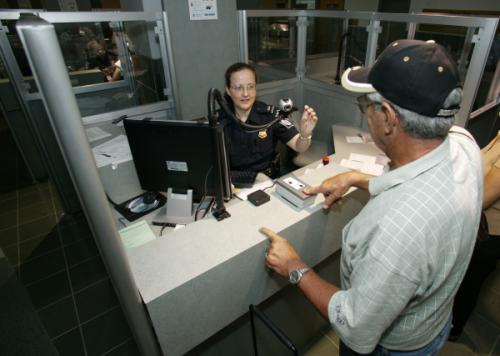
New rules: citizens of seven countries have been barred from the US. (Courtesy: CBP)
By Matin Durrani
Over the last couple of years here at Physics World, we’ve been publishing special reports examining the state of physics in different nations around the world, including Brazil, China, Japan, India, Korea and Mexico.
When we decided in September last year to publish our next special report in 2017 on the US, it seemed reasonable to expect that Hillary Clinton was going to be elected president. For science, a Clinton presidency would pretty much have been “business as usual” and so, probably, would have been the tone of our special report.
But now that Donald Trump is in the White House, it looks as if we’re entering a period where the US is as far removed from “business as usual” as you could imagine.
Physics World columnist Robert Crease presaged the potential problems of the Trump administration in an article written before the new president took charge. Since then, we’ve seen protest marches for science being planned, indications that environmental scientists would be effectively gagged from speaking out on climate change, and no clear indication about who might be installed as presidential science adviser.
And now there is outrage in many quarters about Trump’s decision to temporarily ban people from seven countries – Libya, Iran, Iraq, Somalia, Sudan, Syria and Yemen – from entering the US. Trump’s executive order has thrown into doubt the work, life and travel plans of many foreign students and scientists based in the US.
You can get a sense of those concerns in two powerful blog posts by quantum physicist Scott Aaronson from the University of Texas at Austin and mathematical physicist Peter Woit from Columbia University.
Physicist Rush Holt, who is chief executive of the American Association for the Advancement of Science, believes that the travel ban “will discourage many of the best and brightest international students, scholars, and scientists from studying and working in the US, or attending academic and scientific conferences”.
Implementing the policy, he adds, will “compromise the US’s ability to attract international scientific talent and maintain scientific and economic leadership”.
Meanwhile, the International Astronomical Union (IAU), which held its 2015 general assembly in Hawaii, has released a statement saying it is “profoundly concerned” by the impact that the recent US executive order, and possible reactions to it from other countries, could have on international collaboration in astronomy and on scientific mobility.
At the time of writing, more than 12,000 people had signed a petition by US academics calling for the ban to be ended.
We’ll be planning content for the Physics World US special report over the next few months; it sounds like there’ll be no shortage of material. E-mail your ideas to us at pwld@iop.org.
Guidelines
Show/hide formatting guidelines
this text was deletedwhere people live in harmony with nature and animals</q>
Some text